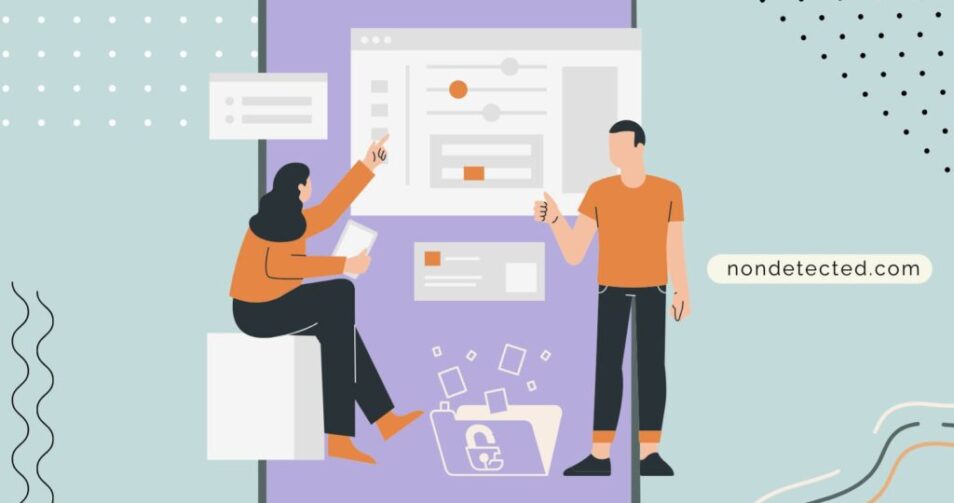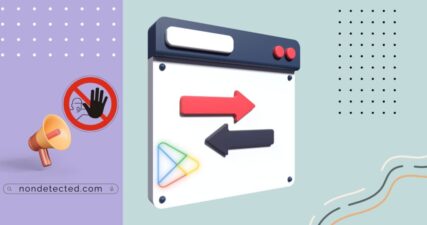Who is a Data Broker? What Info Data Brokers Collect?

In my years of working in online reputation management at NonDetected, I’ve encountered many concerns individuals have about their personal information floating around in the digital space. One of the most pressing questions I often face is, “What are data brokers?”
As someone deeply rooted in this niche of online reputation management, I feel that it’s my duty to shed some light on this topic and educate you on the sophistication of data brokerage companies.
Who Are Data Brokers?
Data brokers operate like silent observers, constantly collecting information about us, often without our explicit consent. These entities, also known as information brokers, gather, process, and sell consumer data to various businesses for marketing purposes, risk mitigation, and more.
From my experience, it’s critical to understand that data brokers collect information from many sources, including public records like census data and bankruptcy records, social media sites, and even other data providers.
This information can range from your basic details to more sensitive data, which might sometimes feel like an invasion of your personal space.
Examples of Data Collection
Data brokers have a knack for collecting information that you might not even remember sharing.
For instance, have you ever filled out a form to participate in online quizzes? Or maybe you’ve shared details about your recent vacation on social media platforms?
If so, data brokers will most likely collect this information to build a comprehensive profile about you.
Let me share a real-life example to illustrate this point further. Have you ever noticed targeted advertising that eerily mirrored your recent search patterns and preferences?
This is a classic case of data brokers working behind the scenes. Data brokers sell information to companies for their targeted ads and advertising campaigns.
What Do Data Brokers Know About Me?

In my extensive tenure in the online reputation management sector, I’ve come to understand the staggering depth and breadth of information that data brokers collect.
When data brokers collect information, it’s not just about gathering bits and pieces of your data; it’s about creating a comprehensive profile containing various facets of your life.
Let’s study the categories of information they usually focus on:
Personal Details
At the fundamental level, data brokers collect personal details that form the foundation of your digital profile.
This includes:
- Your full name, including any nicknames or aliases you might have used.
- Your age, which is often gleaned from public records such as voter registration information or government databases.
- Your current and past addresses which can be traced through utility bills or other official documents.
- Your marital status, including details about your spouse, which can be found in marriage licenses or divorce records.
Financial Information
Data brokers have a knack for digging deep into your financial behaviors, painting a picture of your financial health and preferences.
This encompasses:
- Your purchasing habits, including the types of products you prefer, your favorite shopping platforms, and even the frequency of your purchases.
- Your credit score, which gives an insight into your financial reliability.
- Details about properties you own, which can be sourced from real estate records and other public documents.
- In some cases, they might even have access to sensitive financial documents like bankruptcy records, giving a glimpse into your financial history.
Online Activities
Your online footprint is a goldmine of information for data brokers. They meticulously collect data regarding:
- Your interactions on social media sites, including the posts you like, share, or comment on, and the pages or groups you follow.
- The websites you visit, the articles you read, and the online communities you are part of.
- The newsletters or online platforms you are subscribed to, which can indicate your interests and preferences.
Sensitive Information
In certain instances, data brokers might venture into collecting more sensitive information, which financial institutions and other entities can use for various analyses.
This includes:
- Your health or medical records, which might contain information about your medical history, prescriptions, and even your visits to healthcare providers.
- Your educational background, including the institutions you attended and your qualifications.
- If available, they might also access your criminal records, which can affect your reputation and opportunities.
Trying to remove your data from dozens of broker sites can be exhausting—and inconsistent. There are firms equipped to assist with deleting your personal information from those directories and databases, helping ensure your details don’t keep resurfacing across the web.
Protecting Your Privacy
Given the extensive nature of the information collected, it becomes imperative to protect your data diligently. If the thought of such extensive data collection unsettles you, remember that taking steps to secure this information is within your grasp.
Feel overwhelmed by the amount of information data brokers have on you? Reach out to us at NonDetected for expert guidance on managing your online data.
Being proactive in managing your online presence can prevent third parties’ unauthorized use of your private data.
Are Data Brokers Legal?
Understanding the legal landscape of the data brokerage industry can be quite complex. The General Data Protection Regulation (GDPR) in the European Union has set stringent rules on data processing and collection. However, the scenario varies significantly across regions.
In the United States, for instance, the Federal Trade Commission oversees the operations of data brokers to some extent, but comprehensive data privacy laws are still a work in progress.
From my perspective, individuals must know the legalities surrounding data brokerage. This knowledge empowers you to take the necessary steps to protect your information and understand your rights in the digital space.
A Crucial Aspect of Data Brokerage
During my tenure at NonDetected, I’ve observed that risk mitigation is a significant part of the data brokerage industry.
Data brokers often collaborate with financial institutions and government agencies to help them identify potential risks and frauds.
For instance, a bank might use the services of a data broker to verify the credentials of a person applying for a loan.
Examples of Risk Mitigation
Let me share another instance from my professional journey. I once worked with a client who was a victim of identity theft.
As we dug deeper, we realized that the fraudsters had used information available with data and information brokers to impersonate the client. This is a glaring example of how the data and information broker industry can sometimes inadvertently facilitate fraud and identity theft.
The Intricacies of Data Collection Sites
Data collection sites are a goldmine for data brokers. These platforms collect data from various online and offline sources, creating a comprehensive profile of individuals.
I think it’s vital to understand that these data collection sites operate in a network where information is constantly exchanged and updated.
The Role of Data Providers and Vendors
Data providers and data vendors play a crucial role in the data brokerage ecosystem. These entities supply data brokers and advertising companies with a steady stream of information, which is then used for various purposes, including targeted advertising and marketing campaigns.
From my experience, it’s a common thing to find data brokers paying private companies to access databases with a wealth of consumer data. You might have heard about a situation with Facebook that has been sharing the personal data of their users with third parties.
This collaboration often forms the backbone of the data broker field, facilitating the exchange of information with other organizations on a massive scale.
Protecting Your Information from Data Brokers
As someone who has spent years in this field, I firmly believe that individuals have the power to guard their information to a great extent. Yes, as I always say in all of my blogs, primarily, YOU are the one responsible for your personal data protection!

Steps to Protect Your Data
Below, I’m sharing three working steps you should follow to protect your information from data brokers and data breaches.
Be Cautious with Online Quizzes
As fun as they may seem, online quizzes can be a source of data collection. Be cautious about the information you share on such platforms.
Review Privacy Settings
Regularly review the privacy settings on social media sites and other online platforms to control such information accessible to data brokers.
Opt-Out of Data Broker Sites
Many data broker sites offer the option to opt out of their databases. It might be time-consuming, but it’s a step in the right direction.
In one of my future articles, I’ll explain in detail how you can opt out of data brokers and secure your private data. SO make sure to subscribe or bookmark this blog.
A Glimpse at the Largest Data Brokers
I’ve encountered many data broker companies while working in the online reputation management sector. Today, I’ll share with you those of them who significantly influence the industry.
Here, I’d like to introduce you to some of the biggest data brokers, along with a brief description of each:
Acxiom
Acxiom is a titan in the data brokerage industry specializing in collecting, analyzing, and distributing consumer data. They work closely with companies to facilitate targeted advertising and marketing campaigns.
CoreLogic
CoreLogic mostly focuses on providing data and analytics for the real estate sector. They collect and analyze information related to property, mortgage, and financial data to assist businesses in making informed decisions.
Experian
A well-known name, especially in the financial sector, Experian provides credit scores and engages in data brokerage. They collect and analyze financial data to help businesses assess credit risk and prevent fraud.
Equifax
Similar to Experian, Equifax is renowned for its credit reporting services. However, they also operate in the data broker industry, offering insights into consumer financial behaviors and trends.
Datalogix
Acquired by Oracle, Datalogix is known for its expertise in collecting and analyzing data for digital marketing purposes. They assist companies in creating targeted advertising campaigns based on consumer preferences and behaviors.
Epsilon
Epsilon is a global marketing company specializing in data management, offering services that help businesses create personalized and targeted marketing strategies using a wealth of consumer data.
TransUnion
TransUnion is another giant in the credit reporting sector that also operates in the data brokerage niche. They offer a range of services, including fraud detection and consumer risk management, utilizing a vast database of consumer information.
Nielsen
A global measurement and data analytics company, Nielsen focuses on providing businesses with detailed market research and consumer insights. They collect data from various sources to collect information to help companies understand market trends and consumer behaviors.
Wrapping Up
Nowadays, data broker industry is super common and, unfortunately, complicated. You can significantly safeguard your personal information by being well-informed about the operations of data brokers and taking proactive steps. You should keep in mind that knowledge is your strongest ally in this digital age, serving as a strong cyber shield against potential data breaches and misuse.
Moreover, it’s absolutely OK to find information that might be detrimental to your online reputation in the huge databases of data brokers. Just make sure that in such cases, taking timely action is necessary.
Even after a record is removed from a broker site, it may linger in search results or cached listings for weeks. That’s where outside help that specializes in removing outdated search entries becomes valuable—ensuring your name no longer appears tied to those old listings.
If you ever want to erase yourself from the Internet or just need deletion or correction of information that harms your online reputation, our team at NonDetected is here to help you out.


